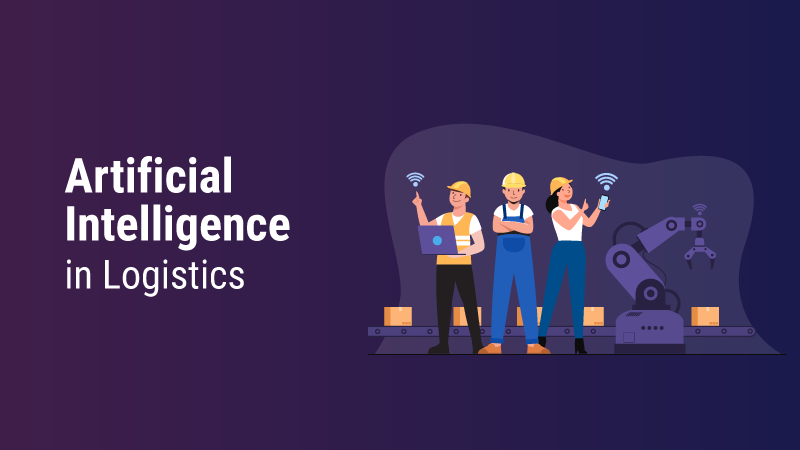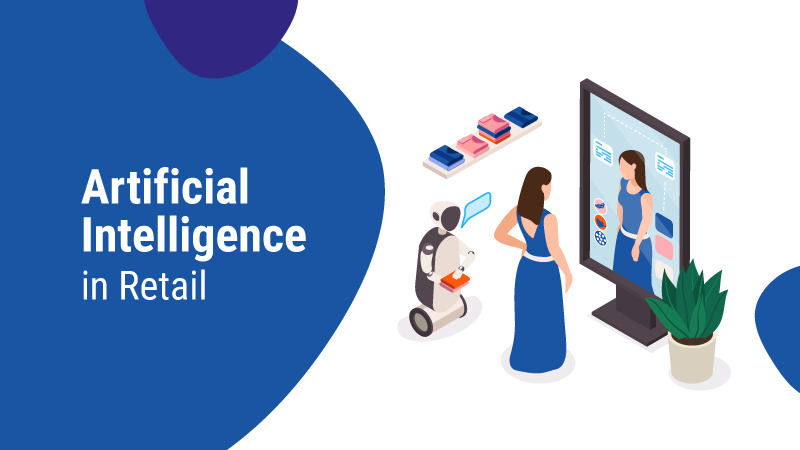Artificial Intelligence in Logistics

Companies that develop artificial intelligence solutions is something that is gaining more attention from businesses and organizations these days. AI has emerged as a huge trend in many industries. The logistics industry is one where artificial intelligence can serve many of its purposes. Transportation, delivery, and product supply are also part of logistics where AI makes a difference.
AI applications in logistics
Though there are different ways of implementing artificial intelligence in the logistics industry, there are some major AI applications or use cases which are explained below:
Planning
Planning for a logistics industry has many aspects. Effective and feasible approaches to planning are very much necessary for coherent coordination and proper use of resources, both financially and humanely. The use of live data along with the smart solutions of artificial intelligence facilitates more precise forecasting optimization and has only a few errors when compared to conventional prediction methods. This enables the manufacturers to manage human resources and other resources in the most efficient and cost-effective way, thus minimizing the holding cost which can lead to costly production.
Automated warehousing
An automated warehousing system is a relevant area where we can employ artificial intelligence. Many businesses are relying on warehouse robots to enhance the management of the supply chain in businesses. The value of warehouse robots with the capabilities of AI in the market was $2.28 billion as per the records of 2016 and is expected to show a growth rate of 11.8%. Since they are driven by artificial intelligence technology, performing tasks like arranging, packaging, and transporting goods and services becomes easy and effortless. Amazon Robotics is one of the best examples of warehouse robots.
Autonomous devices and services
Modern artificial intelligence technology is driving most of the autonomous vehicle systems such as drones, self-driving cars, robots, etc., that offer a helping hand in labor-intensive works at logistics and factories. Artificial intelligence is ideal for these tasks as it does not need analytical skills. Moreover, self-driving cars can significantly reduce the reliance on human drivers. Such technologies aim at supporting the health and safety of the driver by minimizing fuel consumption and excessive emission of carbon from vehicles.
Analytics
The computer vision technology enabled in AI helps in detecting malfunctions by identifying the type and intensity of the damage. This allows the manufacturer to avoid or minimize any further damage and work on the same as it analyzes the live data gathered from sensors installed in the machines. Machine Learning (ML) technology enables analytics tools that improve forecast analysis, and technicians to recognize patterns from sensor data. Hence, allows the manufacturers to take appropriate actions to make the situation better before something goes wrong with the machinery.
Back-end operations
Automation is not just limited to heavy tasks that require a great amount of human effort. It can lift the weight of many silly and repetitive tasks from the worker’s shoulder. AI also contributes to improving the automation of unskilled and hand-operated office work such as billing of products and services, generating reports, email processing, organizing and tracking transportation of goods, employee management, etc. Artificial Intelligence can also improve sales and marketing departments by generating more accurate market analytics, lead scoring, and email marketing.
Conversational agents
Customer service is another important area of logistics on the verge of automation. As AI-driven conversational bots can acquire a significant position in customer service, it is time for the logistics industry to go beyond conventional voice-based picking. Artificial intelligence boosts the use of advanced conversational solutions throughout the logistic platforms from regular consumer interactive platforms to warehouse interactions. Moreover, new innovations in NLP (natural language processing) algorithms expand the scope of conversation AI through:
- Feed in, store, and extract product information.
- Activate an automated picking system in voice-input-assisted warehouses.
- Use voice input to guide drivers.
Sales and marketing optimizations
Many giant automobile companies such as Tesla, Benz, etc., are investing a good share in automated vehicles or autonomous vehicles. As per BCG figures, 25% of the miles covered by private vehicles will be replaced by shared autonomous electric vehicles (SAEVs) in 2030. Drones are also getting much popularity in logistics industries as they are considered a reliable, and safe option for the delivery of various products to different locations, especially products with less shelf life. These delivery drones play a major role not just in eliminating unnecessary costs like delivery charges but also in freight management.
Better demand prediction
It is essential for the successful running of a company to predict the number of goods and supplies required for the future. Any failure to make accurate forecasts and inability to meet the demand because of the low quantity of goods results in financial loss, which is the last thing any company would want to face. When the predictions are not accurate, you will lose inventory and sales. AI algorithms are very good at predicting these trends. In fact, they can predict far better than human specialists, after analyzing the previous transaction history.
Wrap Up
With digitization hitting almost all global logistics companies, steps are being taken to disrupt the Artificial Intelligence (AI) industry. In order to remain competitive and dynamic, international logistics giants like DHL are taking advantage of AI’s machine learning technologies and Robotic Process Automation to efficiently automate crucial business processes. After considering all advantages and benefits it could offer, incorporating Artificial Intelligence technology into the logistics industry is very important to outperform rivals and to bring in a reasonable and positive revolution in the current business world.
Artificial intelligence not only drives the process faster but also gives emphasis to precision and workload reduction in the industry. There are many applications of AI that have proved to be cost-effective, efficient, and useful at the same time. It enables the use of human resources in tasks in addition to people who do not need skills. All these qualities make AI the best option for the logistics industry.
Get Started with our AI ServicesRead more about AI
- Artificial Intelligence in E-commerce
- 7 Real-World Applications of Deep Learning
- Artificial Intelligence in Marketing
- Artificial Intelligence in Finance
- Artificial Intelligence in Banking
- Artificial Intelligence in Everyday Life
- Artificial Intelligence in Insurance
- Artificial Intelligence in Transportation
- Artificial Intelligence in Fintech
- Artificial Intelligence in Cyber Security
- Artificial Intelligence in Manufacturing
Blogs by Category
AppForms Artificial Intelligence Blockchain Call Centers Chatbots Cloud Computing Data Management Design Digital Marketing Digital Transformation Enterprise Applications FinTech Insights LowCode Development Microsoft Mobile Apps News Office 365 Robotic Process Automation Security SharePoint Software Development Web ApplicationArtificial Intelligence in Retail

2024-05-23 14:12:28